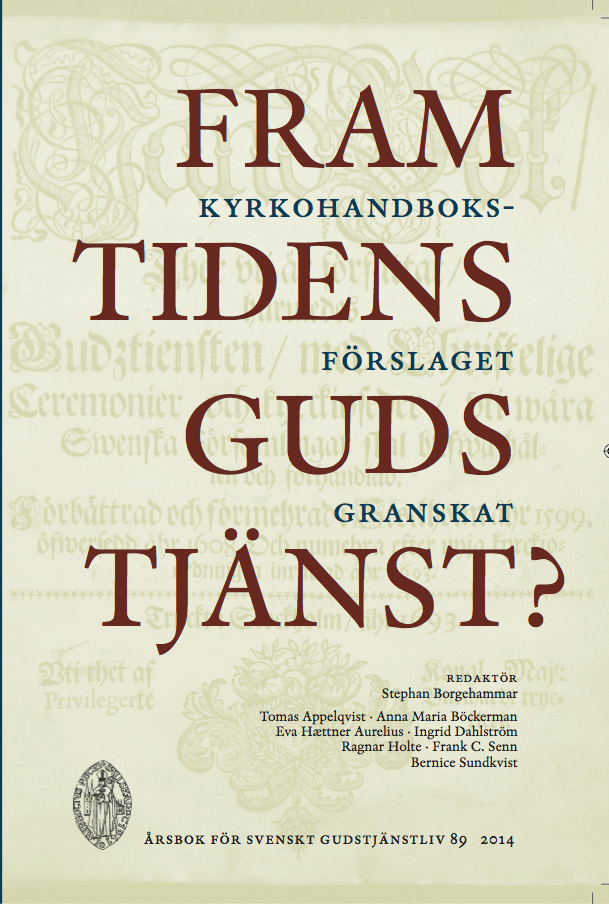Befrielse på folkspråk? Språk och ecklesiologi i reformationstida kyrkoordningar och i kyrkohandboksförslaget
Abstract
Liberation in the Vernacular Language and Ecclesiology in Reformation Church Orders and the Proposed Kyrkohandbok for the Church of Sweden
In the proposed Kyrkohandbok (worship book), the concept “Evangelical-Lutheran tradition” is often used as an argument for the changes in liturgy that the proposal wants to introduce. Three aspects of this argument have been studied in this article: language, music and the preparation before communion. The proposal claims that a vernacular language (including the language of music) and a high level of recognisability in the liturgy express basic Lutheran convictions. The formula simul iustus et peccator is interpreted as an argument against the traditional practice in the Church of Sweden, that the person who receives Christ in bread and wine must first have made his confession (normally in public together with the whole congregation, using a general formula that everyone reads). It is claimed that all people are both sinners and saints and that they therefore need to have their immediate access to God confirmed, without a previous confession of sins. An important ecclesiological consequence of this interpretation is that the Church mainly gets the role of confirming the secular experiences that individuals in the worshipping community have made.
In the article, the Swedish liturgical tradition from the Reformation is studied on the basis of the Church Order of Laurentius Petri from 1571. The Swedish tradition differs from the German, since the liturgical books were the only officially recognised Lutheran documents until the year 1593, when Sweden became an explicitly Lutheran country and accepted the Confessio Augustana. The Church Order of Laurentius Petri shows that early Lutherans mostly continued the liturgical life inherited from the medieval church. 1 Corinthians 14 was interpreted as an exhortation to the church to “talk intelligibly”, which it does when vernacular language is used, and at the same time also to allow the incomprehensible language of the Holy Spirit, which is spoken when Latin is used. This use of a “higher” language is seen as uniting the local congregation with the universal church.
Both Swedish and German Reformation texts show that the preparation before communion had an important pedagogical function, for both the individual and the congregation as a whole. There are also several parts of Luther’s theological writings that show how he regarded music as an important gift of God that has to be practised with erudition and in a highly artistic way. For Luther, this view of music was an important difference between his thinking and the more radical view that was held by Karlstadt and his iconoclastic or “abergeistlichen” fellows.
The conclusion of the article is that the proposed handbook has to be thoroughly revised if it is to do justice to the original Lutheran thinking on language, music and the preparation before communion. The changes have to be made for both logical and historical reasons, since many of the concepts that are used in the proposal are vague and therefore function more as a way of legitimizing a certain interpretation than as balanced tools for implementing the original Lutheran views. In order to make “Evangelical Lutheran tradition” a more useful and practical concept in theological work, the article concludes with a discussion of some important aspects of Lutheran ecclesiology that are often described as weaknesses in Lutheran theology, such as individualism and the invisibility of the church. These claimed weaknesses are clearly present in the proposal. At the same time, original Lutheran thinking provides a range of constructive ideas on how these issues can be handled.
Downloads
Publicerad
Nummer
Sektion
Licens
© författarna, Laurentius Petri Sällskapet för svenskt gudstjänstliv samt Artos & Norma bokförlag. Det är tillåtet att kopiera och använda material ur Svenskt Gudstjänstliv för forskningsändamål om källan anges. För övriga ändamål kontakta respektive artikelförfattare samt förlaget. Särskilda restriktioner kan gälla för bildmaterial.


